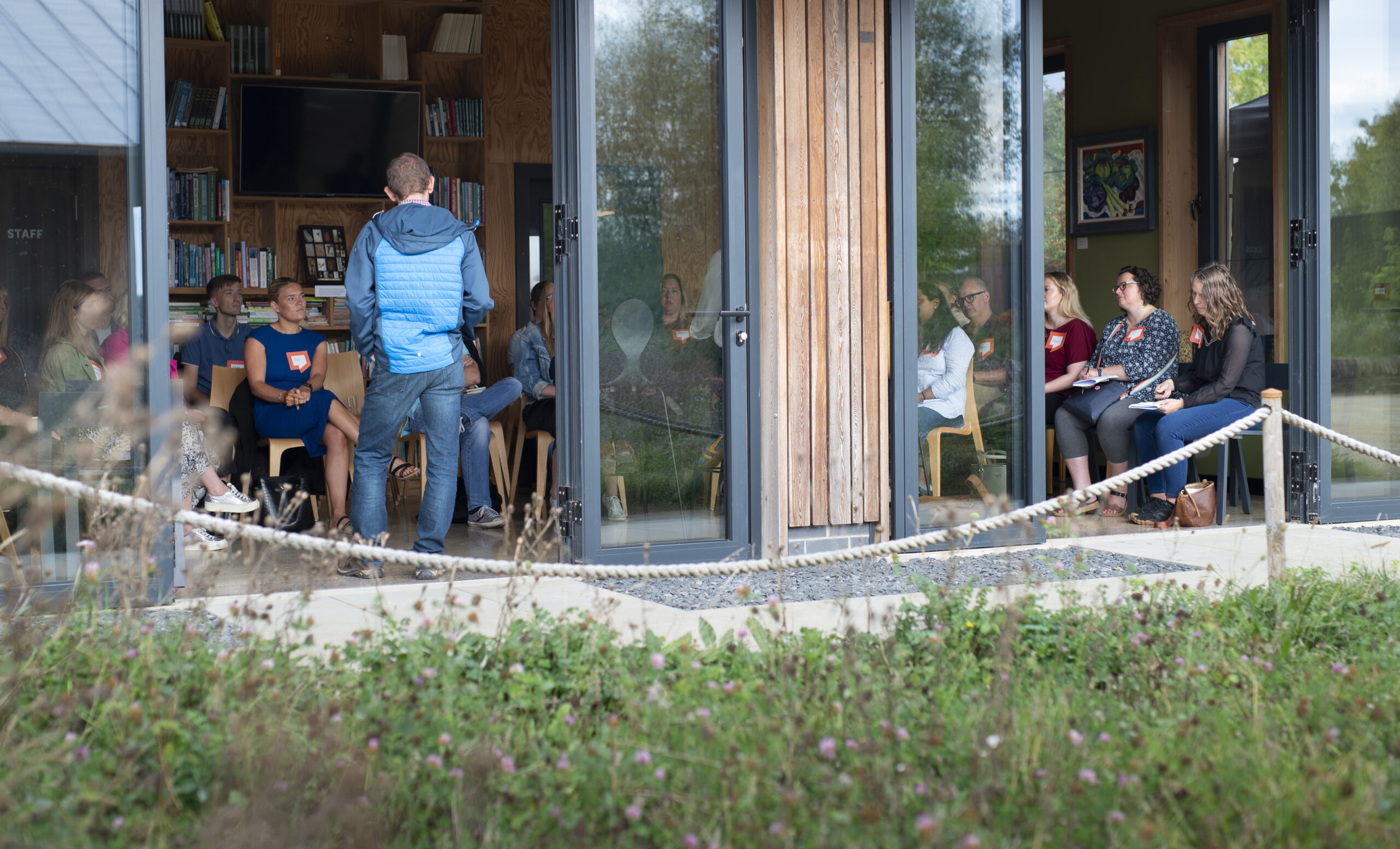Ever-popular Assembly regular, Les Cameron of M&G Wealth, joined us to answer the question ‘What’s going on with the lifetime allowance?’
Why? Because in his Budget statement to the House of Commons earlier this year, the Chancellor of the Exchequer, Jeremy Hunt, announced the removal of the amount you could hold in pension savings before becoming liable for tax.
And that’s quite the change. Because it’s not all that long since Hunt’s predecessors stood accused of levying ‘stealth taxes’ by freezing the LTA at to £1,073,100 – potentially exposing an influx of pension savers to tax liabilities thanks to the effect of inflation.
So with proposed legislation removing the LTA and introducing a rise in the annual allowance, doesn’t the future look rosey for pension savers and their pots?
Or do other proposed measures – like setting a limit of £268,275 on tax-free lump sums – muddy the waters a bit?
Well, that’s where Les came in. Because over the lunch-hour session he:
- recapped the saga of the lifetime allowance so far
- explained the changes that the government has proposed
- explored what’s already happened (and what’s still left to happen); and
- considered what it all means for paraplanners working on retirement planning cases for clients.
Be honest. This stuff is like catnip to a paraplanner isn’t it?
Listen now

If you’re a paraplanner who lives or works in striking distance of central London, then The Other London Assembly from 10am on Friday 20 October 2023 will be right up your street.
Hosted by Dan Atkinson and Andy Schleider, this is your chance to gather with paraplanners from your neck of the woods to learn what’s going on in each other’s worlds, share ideas, and discover practical tips and illuminating insights.
Book your spot and you’ll be able to shape the agenda for the two-hour get-together but – right now – we expect paraplanners taking part to exchange ideas on report writing and, now that the consumer duty is a feature of daily life, explore how we’re demonstrating ‘fair value’ in annual reviews.
Plus, the chance to tackle any other paraplanning topic that’s on your mind when we gather at the London Wall Place office of Barnett Waddingham.
From our very first meeting in 2013, the Paraplanners’ Assembly has created gatherings – in person and online and all over the UK – that spark collaboration and conversation.
Expect the same from The Other London Assembly.
After all, Assemblies only happen because paraplanners show up. You’ll feel you belong at The Other London Assembly because The Other London Assembly belongs to you.
So how about it? Book your spot now.
Capacity for loss. What is it? What isn’t it? And why it should be a paraplanner’s BFF* (if it isn’t already)?
To explore the topic, the Assembly’s own BFF, Patrick Ingram from Parmenion, joined us for a lunch-hour Assembly during which we covered some really interesting stuff including:
Capacity for loss and attitude to risk. What’s the difference?
Even though the combination of a client’s capacity for loss and their attitude to risk are significant factors when you’re working on a case, Patrick showed us why both ideas are so different – and what that means for clients.
Get busy with client balance sheets
We dug into ideas like ‘client balance sheet’ and ‘wealth ratios’, and explored how they offer both strategic and practical ways to settle on an investment approach that fits their financial position.
Safety first
We explored the idea of a ‘safety margin’. What is it? And how does the idea help insulate clients from financial risks while still allowing them the flexibility to adapt their strategy through life’s ups and downs?
When capacity for loss is such a significant feature of the day job, this was a great chance to catch up with the latest thinking.
*BFF = best friend forever
There are times when we’re recording an online Assembly or bitesize video or dedicated podcast episode and we just think OMG EVERYONE IS GOING TO ABSOLUTELY LOVE THIS.
And that’s the case with this interview with consultant and founding director of About Consulting Group, Jon Dunckley.
Because this podcast is all about neurodiversity.
(Its origins lie in this comment by Planner12 posted at The Big Tent last year.)
And, as Jon (who is autistic) says very early on in the episode, neurodiversity matters to me, you and everyone.
After all, we each have a way of thinking that’s unique to us. We all occupy our place in a neurodiverse world.
But if the way we think is plotted on a spectrum, most of us would be considered ‘neurotypical’.
Yet plenty of us – at least 1 in 10 in the UK – function, learn and process information differently from the neurotypical.
Neurodifference and work
We may be neurodifferent but, despite thinking differently, we’re expected to adapt and succeed in a world that’s geared towards neurotypical people.
And that’s why we thought Planner12’s question – and the thread that their comment sparked – was such a great starting point to consider neurodiversity and its consequences personally and professionally whether we’re neurodivergent or neurotypical.
Because even if we’re not neurodifferent ourselves, people we work with will be. Either way, what do we need to consider about day-to-day working life so we each get the chance to thrive, contribute and gain fulfilment from work?
What do we mean by neurodifferent? What conditions are considered neurodifferent? If you’re neurodifferent, do you mention it to your employer? Do you need a diagnosis? What’s your approach to studying and sitting exams? How should you adapt your leadership style for a range of neurodifferent conditions? And how does your condition influence the way you manage your team?
Invaluable insights and practical tips
In just under an hour, host Richard Allum and Jon explore just about everything you could possibly want to cover.
Expect talk of autism, ADHD, dyspraxia, dyscalculia, dyslexia and dysgraphia. Learn about TIC syndrome, the ‘Pygmalion effect’, why people with ‘spiky profiles’ are good for business. Plus why job adverts should (a) encourage applicants with spiky profiles and (b) be really clear about what a job will actually involve.
And there’s so much more.
In fact, this is an area we’re going to explore more – and not leave it too long before we do. So if you think of anything that the Assembly could explore once you’ve listened please get in touch and tell us what you think.
Now, tuck in to this latest episode. We think you’re going to love it.
Listen to the Assembly
A few of links mentioned by Jon during the episode
British Dyslexia Association: Dyslexia-friendly style guide
The Neurodiverse Workplace by Victoria Honeybourne
Think Human Business Writing course
BTS podcast: Neurodiversity and studying for regulated exams
PFS Power: Working with vulnerable clients
Cornell note-taking system (YouTube video)
Online Assembly: Design principles for reports
Host Richard Allum was joined by experts Rachel Geary and Murray Smith from Barnett Waddingham for a lunch-hour session exploring what clients need to know if they want to invest in property as part of their pension
Together, they covered the technical, regulatory and legal issues that influence pensions and property, and served up really valuable insights along the way.
Among the topics covered were:
- Why buy a commercial property with a pension?
- SIPP vs SSAS. What, why and when?
- Rules about property in a pension
- Technical and legal things to know about investing in commercial property with a pension
- FAQs. Which things crop up time and again?
- What can go wrong – and how to avoid it happening
Listen now
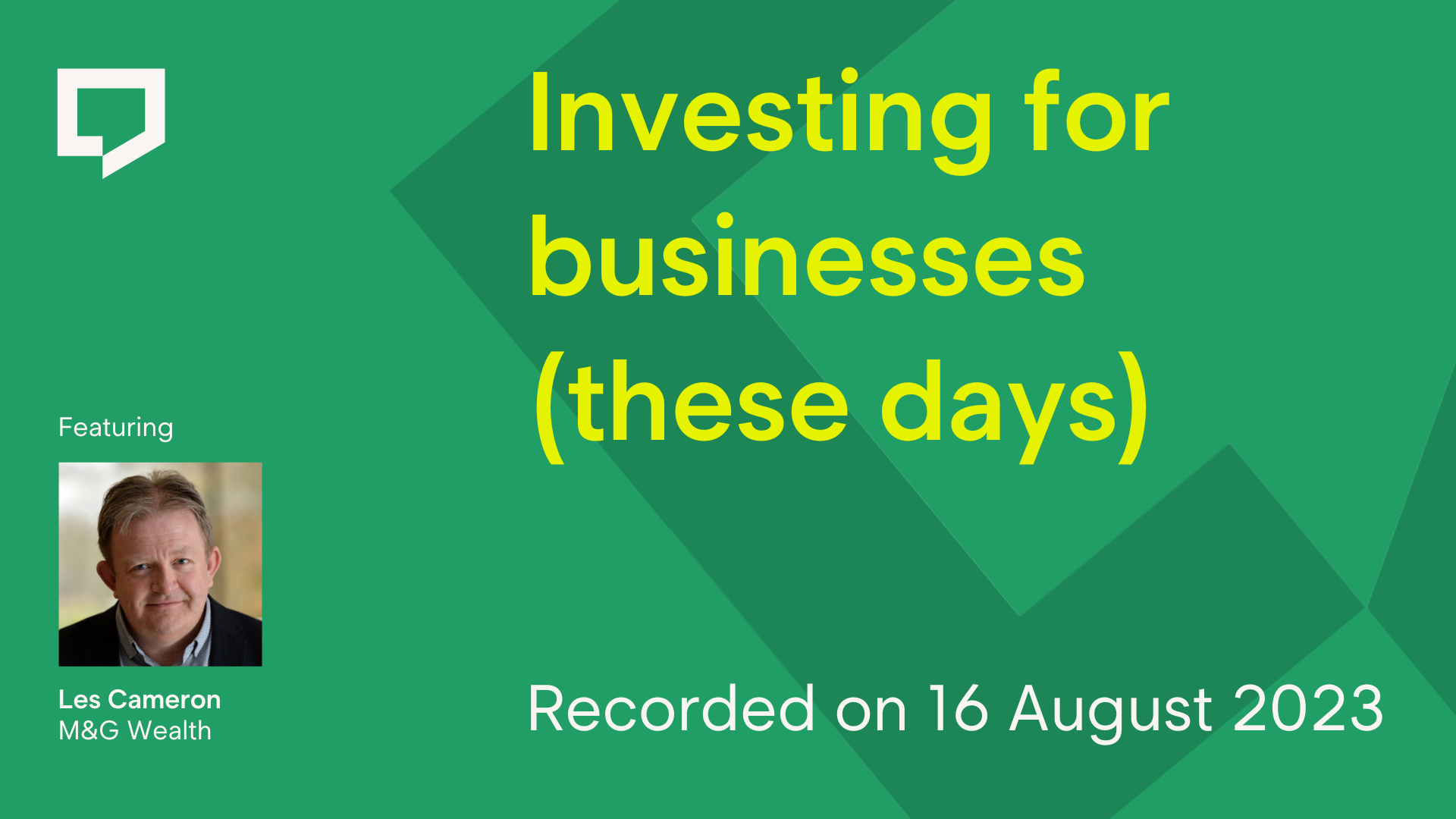
Popular Assembly regular, Les Cameron of M&G Wealth, joined us in something of a follow-up to last November’s online Assembly on financial planning essentials for small businesses.
As you’ll know if you tuned into that Assembly, there are already plenty of reasons for business-owning clients to consider investing surplus profits rather than, for instance, taking them as income.
But April’s 6p rise in corporation tax could add impetus to business owners interest in weighing up their options.
Yet there’s so much uncertainty around these days – even about once relatively dependable vehicles like bonds – so what strategies should you be considering for clients with businesses?
During this lunch-hour online Assembly, Les explored investment options, discuss tax treatments and tackle the topic of demonstrating suitability.
So if you have clients with businesses – or run a business yourself – why not tune in?
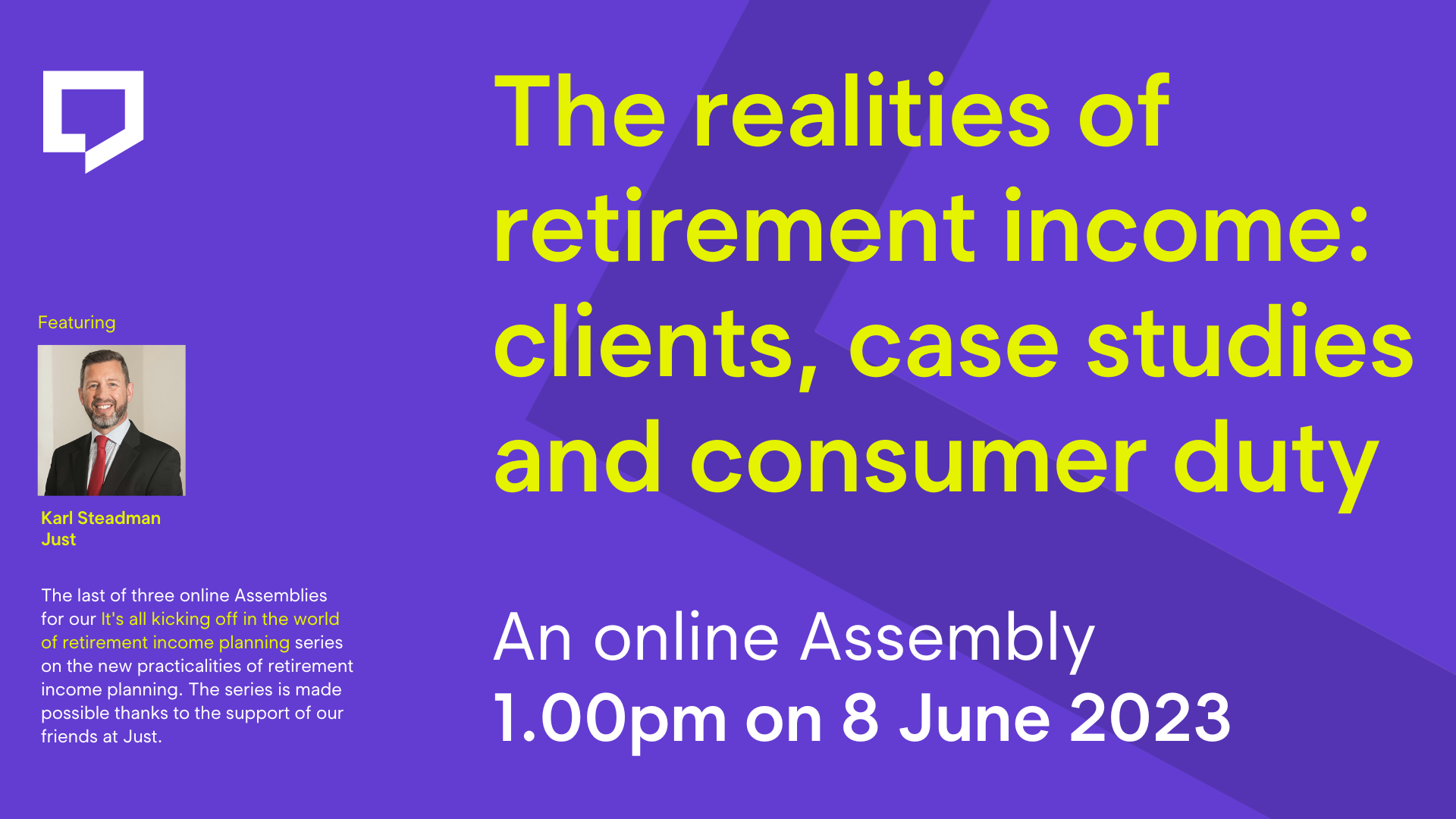
This was the third in our three-part series of It’s all kicking off in the world of retirement income planning Assemblies exploring the new practicalities of retirement income planning – a series made possible with the support of our friends at Just.
In the first Assembly, we looked back at the events that changed the world of retirement income and what the consequences of this change means for paraplanners, advisers and clients.
In our second, we considered the practicalities of researching, creating and executing a plan for clients.
In the third and final part of the series, we explored three case studies – each allowing us to consider the suitability of different strategies to meet the ambitions for retirement income of each client. To help, we were joined by Karl Steadman from Just.
Naturally, we also considered how the Consumer Duty affects the choices available too.
CPD and resources
Scroll down to see links to resources mentioned during the event plus a video replay and podcast episode link.
You’ll also see that we’ve published a link to a CPD survey. Once you complete the survey, a CPD record of your attendance will be emailed to you automatically.
Catch up with parts one and two
If you missed the first two Assemblies in the series, pop over to the Why is it all kicking off in the world of retirement income planning? (Part 1) and Getting real: the new practicalities of retirement income planning (Part 2) where you’ll find a video replay and podcast episode link plus links mentioned during the event.

Join us online at 1pm on 1 June 2023 for the second in our series of It’s all kicking off in the world of retirement income planning Assemblies exploring the new practicalities of retirement income planning – a series made possible with the support of our friends at Just.
In our first Assembly, we asked why it’s all kicking off in the world of retirement income and considered events that have prompted paraplanners to consider an expanding range of strategies to help clients achieve their retirement income goals.
In this Assembly we’ll be getting real by digging into the paraplanning practicalities. During the lunch hour session we expect to cover:
- what the research says
- using forecasting software to consider annuities and secure lifetime income
- looking at modelling examples
- what it all means for assets under management and client risk profiles
- how it works on a platform
To help, we’ll be joined by guests Jean-Paul Grenade and Karl Steadman from Just.
CPD and resources
Following this Assembly we’ll publish links to resources mentioned during the event on this page plus a video replay and podcast episode link,
We’ll also publish a link to a survey. Once you complete the survey, a CPD record of your attendance will be emailed to you automatically.
Book the final session in the series now
In the third and final part of the series – you can book your spot here now – we’ll be gathering online at 1pm on 8 June 2023 to explore three case studies. Each case will allow us to consider the suitability of different strategies to meet the ambitions for retirement income of each client. Naturally, we’ll be considering how the Consumer Duty affects the choices available too.
Watch part one
If you missed the first Assembly in the series, pop over to the event page – visit Why is it all kicking off in the world of retirement income planning? – where you’ll find a video replay and podcast episode link plus links mentioned during the event.
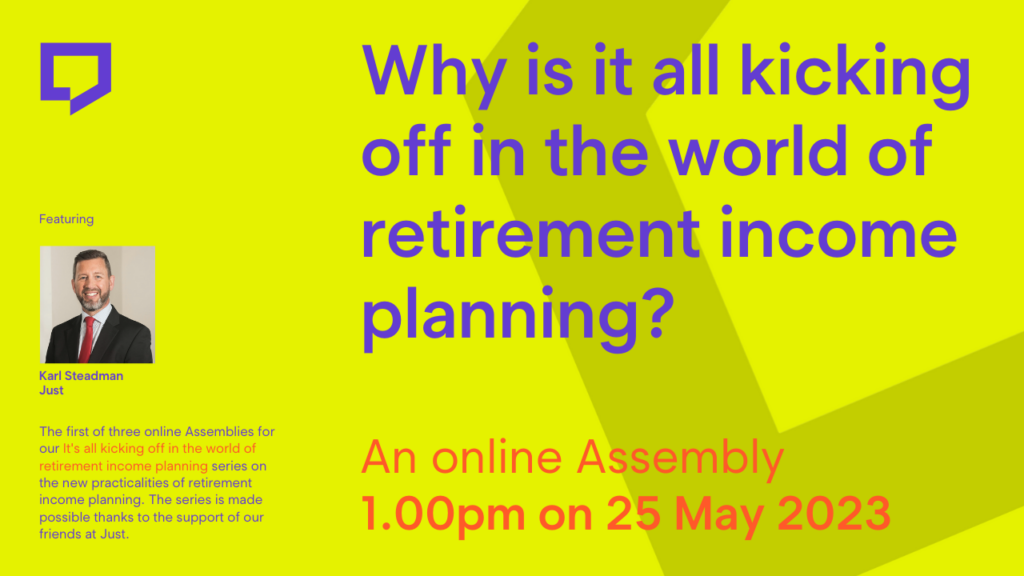
Years of stability in the retirement income planning world changed abruptly on 23 September 2022 when former Chancellor of the Exchequer, Kwasi Kwarteng, presented his ‘mini budget’.
Ever since, uncertainty about rising interest rates, anxieties about inflation, and even worries over the stability of pension funds themselves, have led paraplanners to rethink how clients can achieve the outcome they want from their financial plan.
One consequence of all this? Secure lifetime income has become a thing. And annuities are back in fashion.
What’s more, the demands of the consumer duty means more and more firms are kicking the tyres of their centralised retirement propositions to test suitability – or are setting one up for the first time.
In other words IT’S ALL KICKING OFF IN THE WORLD OF RETIREMENT INCOME PLANNING. And in the eye of the storm (because it does feel a bit like that doesn’t it?) there are paraplanners.
So how are we supposed to make sense of it all? What do we need to know? And what should we be doing about it? (And – while we’re talking about it – how DOES an annuity work?)
It’s all kicking off in the world of retirement: a series of online Assemblies with Just
Working with our friends at Just, we’re hosting a series of three online Assemblies to help you understand where we are, how we got here and – by combining case studies and practical tips – give you the knowledge you need to navigate what’s ahead.
1pm on 25 May 2023: Why is it all kicking off in the world of retirement?
In this first session in the series, we were joined by Karl Steadman from Just to explore what’s changed in the world of retirement income planning and what it means to paraplanners. During the Assembly we covered:
- what’s happened in the economy and markets
- why things won’t be the same again
- what it all means
- income stability and sustainability
- what is an annuity
- assessing attitude to risk
Save your spot at the second and third Assemblies in this series
The second Assembly in this series – ‘Getting real: the new practicalities of retirement income planning’ – is taking place at 1pm on 1 June. For more info and to save your spot now visit the event page now.
Join us online for the third and final Assembly – called ‘The realities of retirement income: clients, case studies and consumer duty’ – which starts at 1pm on 8 June. Grab your spot and get more info here.
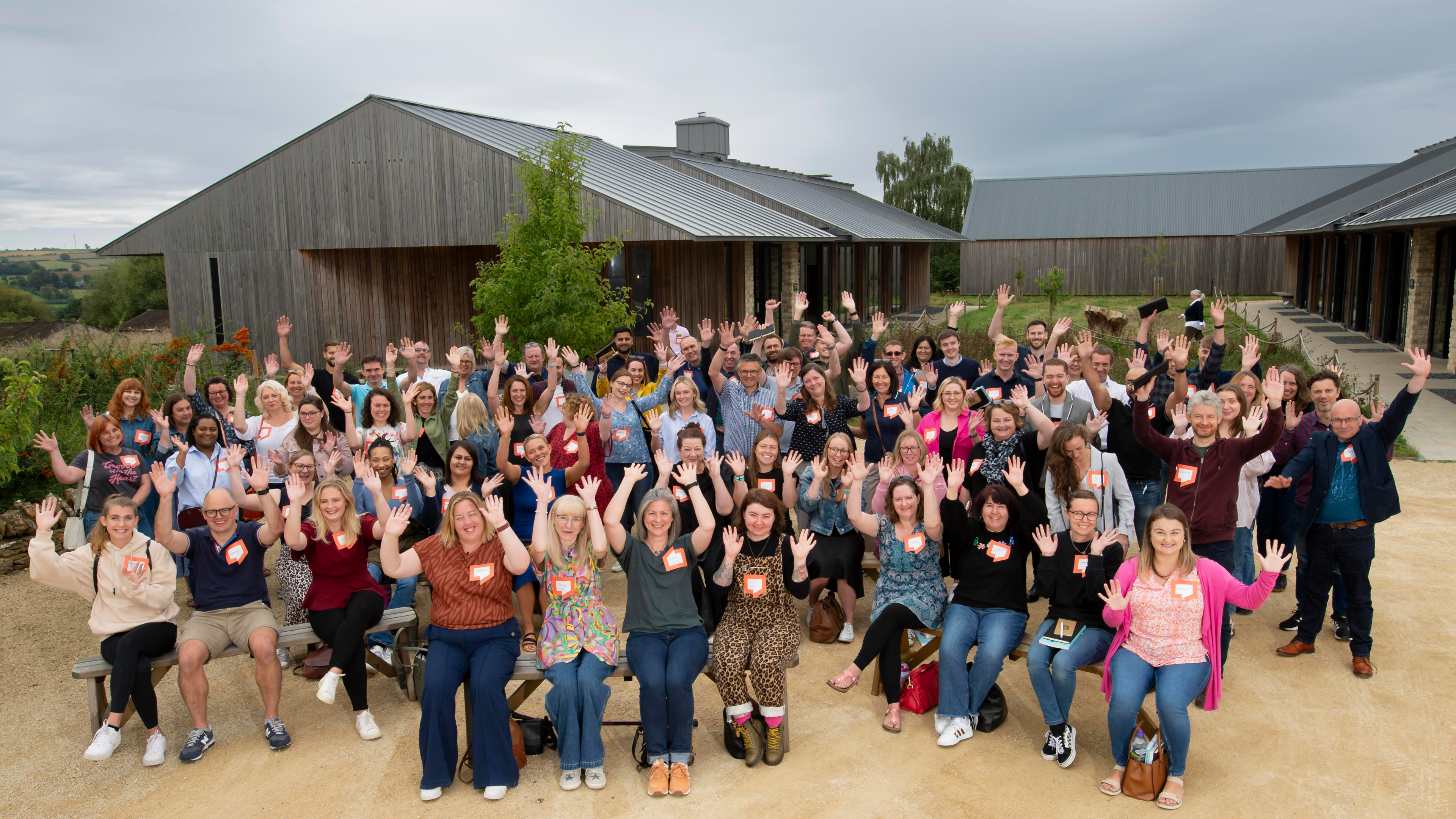
Paraplanners from all over the country gathered for The Big Day Out 2023 on 14th September 2023.
For the second successive year, our destination was the fantastic FarmED – right in the heart of the Cotswold countryside.
(Trust us, it’s lovely.)
This year, The Big Day Out was split into two halves:
1st half: All about paraplanning today
2nd half: All about paraplanning tomorrow

Three groups
Following The Big Welcome, we split the Assembly into three groups – Barley, Oats, and Wheat.
Each group had paraplanning hosts. Hosts volunteered to make sure you were where you needed to be when you needed to be there and to help facilitate conversations.
(The Big Day Out wouldn’t have been possible without our volunteers, so please gave a big hand 👏 to this year’s hosts: Kez Condy, Becky Jones, Jackie Manning, Sian Davies Cole, Pippa Oldfield, Jo Parkes, and Colin Stewart.)
First half: Paraplanning today – Crop Rotations
Each group spent 45 minutes in each of the following three sessions.
Technical top tips
Expert: Les Cameron, Head of Technical, M&G Wealth
This was a chance to quiz a popular Assembly regular in person with those burning technical questions that you’ve always wanted someone to answer.
Suitability reports: a fair value assessment
Leader: Caroline Stuart, Founder of Sparrow Paraplanning
Caroline invited groups to consider whether suitability reports were still fit for purpose and they’ve for a Consumer Duty world.
Were our planning assumptions still fit for purpose?
Leader: Dan Atkinson, Head of Technical, Paradigm Norton
Is it time to re-assess your planning assumptions? Could you really rely on what had happened in the past to plan for the future? This was a chance for participants to test the assumptions that apply to the ‘planning’ part of a paraplanners job title. To help, we were joined by three experts: Thomas Hogg of Timeline, Parmenion’s Jasper Thornton-Boelman and Jon Palin from Barnett Waddingham.
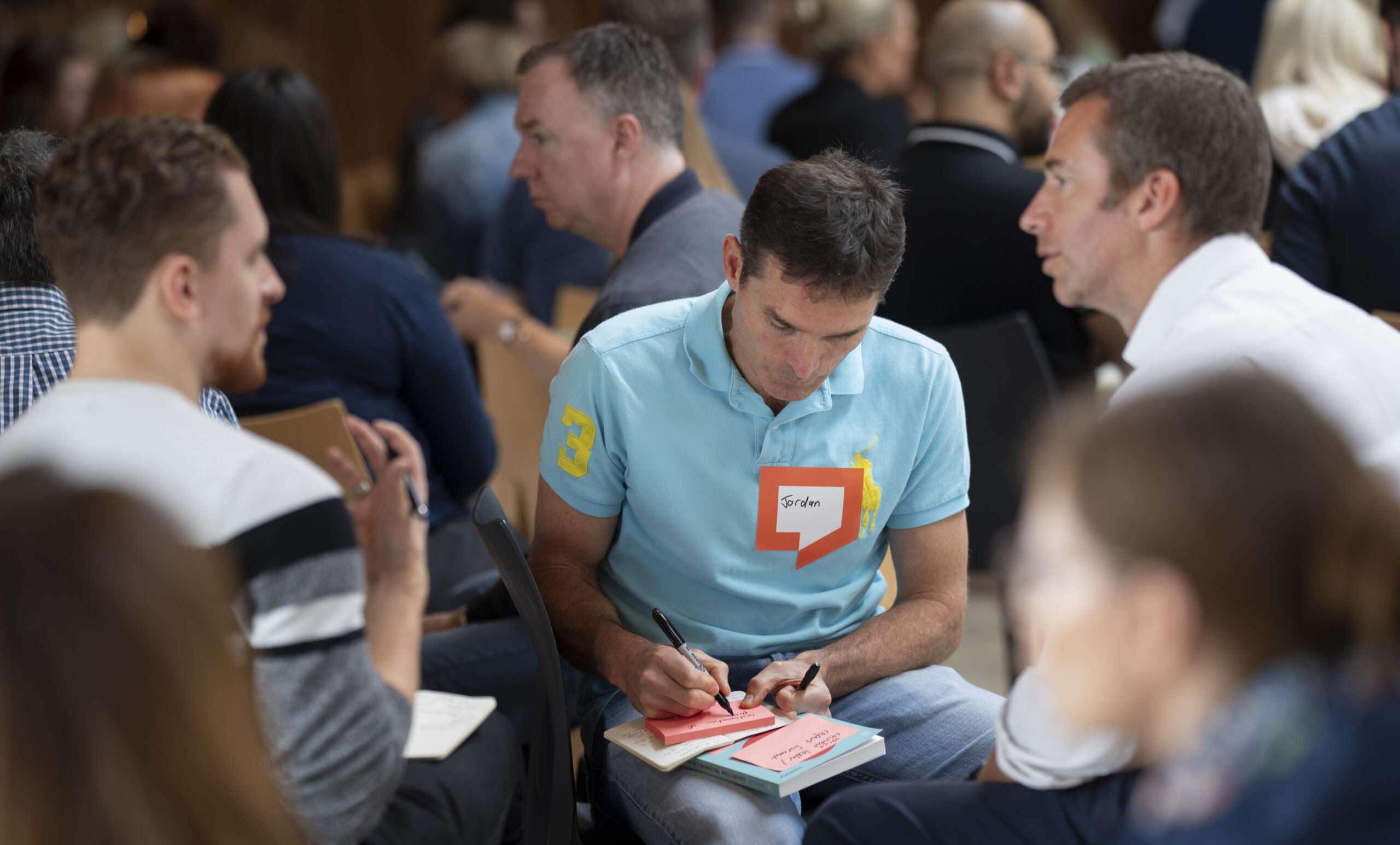
Lunchtime drop-in: Outsourced Paraplanners Banter + Chat x Paraplanners’ Assembly
Lunchtime drop-in: Outsourced Paraplanners Banter + Chat x Paraplanners’ Assembly
Christina Georgiou and Andy Schleider hosted a drop in for participants who are starting out as an outsourced paraplanner, thinking about it, or already are. The session was an IRL version of the ‘Outsourced Paraplanners banter + chat group’ hosted by Andy on WhatsApp.
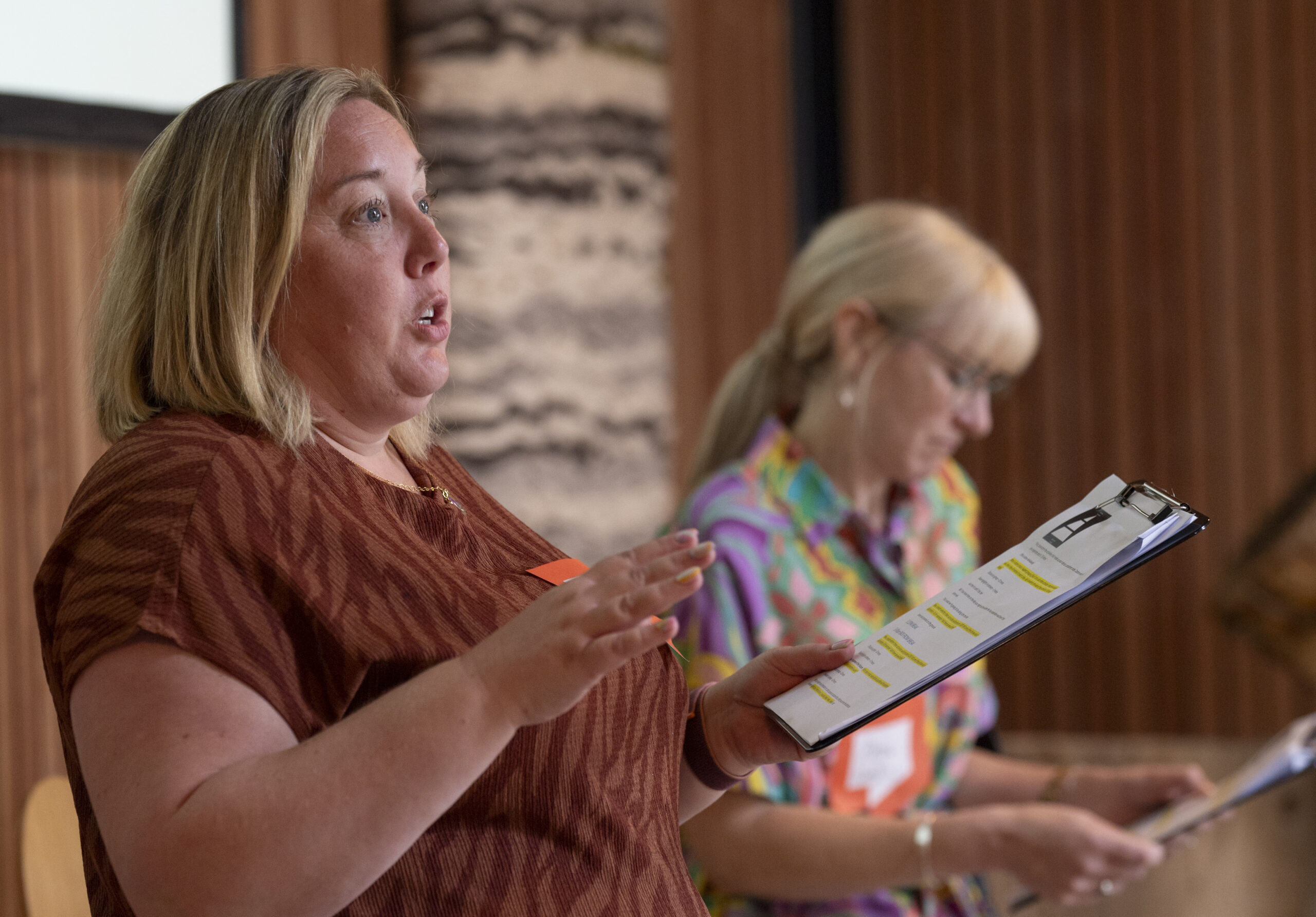
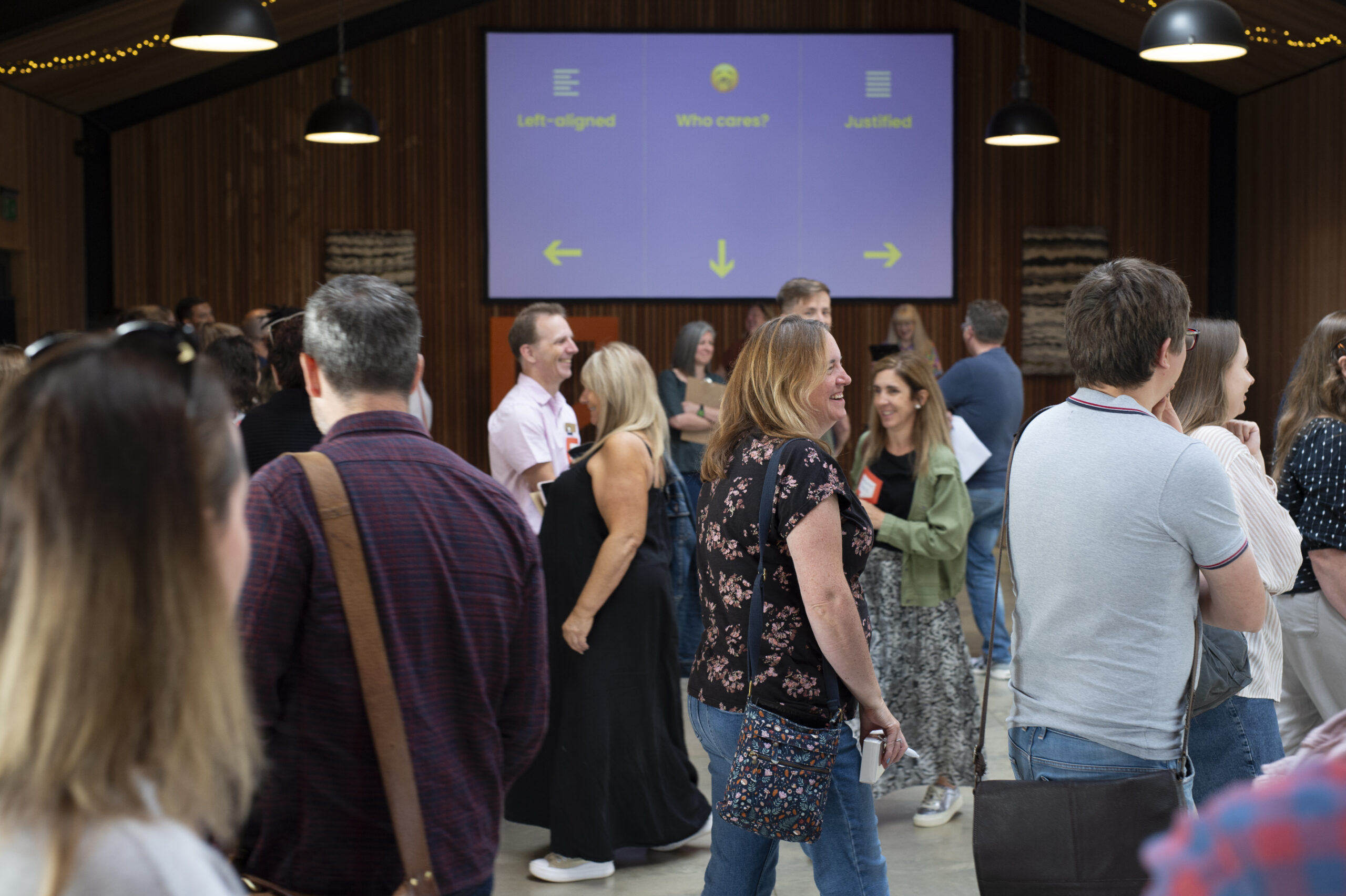
The Afternoon: Paraplanning tomorrow
After lunch, we got right back to the roots of the Paraplanners’ Assembly.
Back in 2013, our first gathering proved that when paraplanners get together to learn, fix and share, we’re able to tackle the biggest issues.
A decade ago, we wanted the financial planning world to recognise paraplanning as a choice of professional career. (And just look at us now!)
Today, the big questions seem to revolve around the future of paraplanning itself and our role in it.
What does artificial intelligence and automation mean for paraplanning and for us? Are remote working and hybrid teams really here to stay? What skills and knowledge are paraplanners going to need for a fulfilling career from now on?
Learn, fix and share
When we began to think about how to tackle these questions, it crossed our minds to invite a keynote speaker to put the world to rights for us.
But we soon realized that that speaker didn’t exist.
Because the future of work was not just about technology. It wasn’t just about personal development and technical knowledge. It wasn’t just about teams and leadership. It wasn’t just about the future of business.
It was too big a job for one person. But a bunch of people? Perhaps even an assembly?
And so we decided that the best people to consider the future of paraplanning were…paraplanners!
Let’s get started
Assembly hosts, Sam Tonks and Sarah Lees, kicked off the afternoon’s session.
We worked with foresight and innovation expert, Eleanor Winton, to help us design three very interactive sessions.
Eleanor recorded two video contributions that we showed to spark your thinking.
But the future of paraplanning? That conversation was up to us.
We knew from the surveys you completed that this kind of thing had been on your minds for a while. And we thought the Assembly was the perfect space for paraplanners to explore it. But you only got out what you were willing to put in, so you were ready to share your thoughts!
We were sure you were going to really enjoy it. We were sure you were going to feel good about having the chance to talk about the future. And we were certain it would be the start of a conversation that – thanks to your participation – our Assembly was uniquely placed to encourage among colleagues across the world of financial planning.
(And, besides, we arranged ice-cream in the break to fuel conversations!)
If you were there, we hope you enjoyed it. If you weren’t, there’s always next year!




